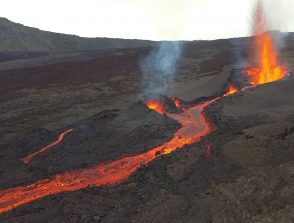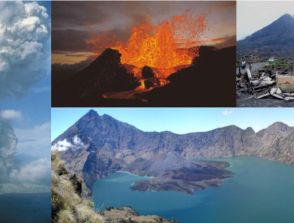Analysis of multidisciplinary signals by intelligent algorithms for the anticipation of eruptions at Piton de la Fournaise
Start: 01 October 2022
Supervisors :
Charles Le Losq, Aline Peltier, Lise Retailleau
Related observatories :
Volcanological Observatory of Piton de la Fournaise (OVPF-IPGP)
Related teams :
Volcanic Systems
Status: In progress
The hazards and risks arising from the activity of volcano edifices are numerous and often difficult to predict. The consequences of a poorly anticipated eruption can be dramatic, as shown by several recent historical cases (e.g. El Chichon, Mexico, in 1982: 1,900 victims; Mt Pelée, France, in 1902: 30,000 victims). Currently, active French volcanic edifices are closely monitored by the volcanological and seismological observatories of the Institut de Physique du Globe de Paris (IPGP). Various geophysical (seismology, deformation, GPS, etc.) and geochemical (monitoring gas emissions, fumarole temperature, water geochemistry, etc.) methods are indicators of volcanic activity and make it possible to anticipate eruptions. The interpretation of these data thus guides the authorities in the decisions to be taken concerning risk mitigation. However, human analysis of the data is potentially difficult due to the ever-increasing quantity and diversity of the data. Moreover, the linking of observations of very different nature, such as seismology and gas flows, is complex.
In this project, we propose to solve this problem through the adoption of machine learning algorithms. The latter is widely used for the detection of seismicity, and has been proven in different contexts, tectonic and volcanic, as well as for induced seismicity. In geochemistry, data analysis via machine learning is also increasingly used, especially to replace imperfect empirical models. Various machine learning algorithms have been developed to detect potential eruptions on certain buildings. These algorithms are usually trained on a particular dataset (e.g. seismic, or INSAR, or infrared imaging). However, to the best of our knowledge, there is no algorithm that can simultaneously analyse the different geophysical, geochemical and climatic observables. The objective of this project is therefore to implement such an algorithm. This approach will improve the robustness of the detection of magma movements and potential eruptions.
We will take as a case study the Piton de la Fournaise, on the island of La Réunion. This volcano has erupted very frequently over the last 20 years. Geophysical and geochemical data series with a very good spatio-temporal coverage are available. These data are marked by several major eruptions. In addition, they include periods with few eruptions over several years, and others with several eruptions per year.
This diversity will allow us to set up, develop and test different algorithms in order to select a method with a high robustness. The detection of flares will be done through the detection of anomalies in the data set. One of the keys and difficulties of this project lies in the joint analysis of data of different types (geophysical, geochemical, meteorological) with different time steps. This could be achieved, for example, by combining several algorithms. For example, one possible method would be to use several neural networks called autoencoders (one per type of data) connected to a feedforward terminal neural network evaluating the abnormal or not character of the data series, via the different successes of reconstruction of this series by the different autoencoders. In addition, the exploitation of the spatialization of the data for eruption detection could also be explored, for example potentially via graphical neural networks.
This work will help the IPGP in its mission of monitoring frequently active French volcano edifices. This thesis proposes to the candidates to develop and combine various knowledge and collaborations in different disciplines (geochemistry, geophysics, data science, machine learning). This work will contribute to the development of the digital volcanological observatory of the 21st century. This thesis represents a unique opportunity for the student to acquire skills and knowledge that can be used in numerous and diversified professional projects.






